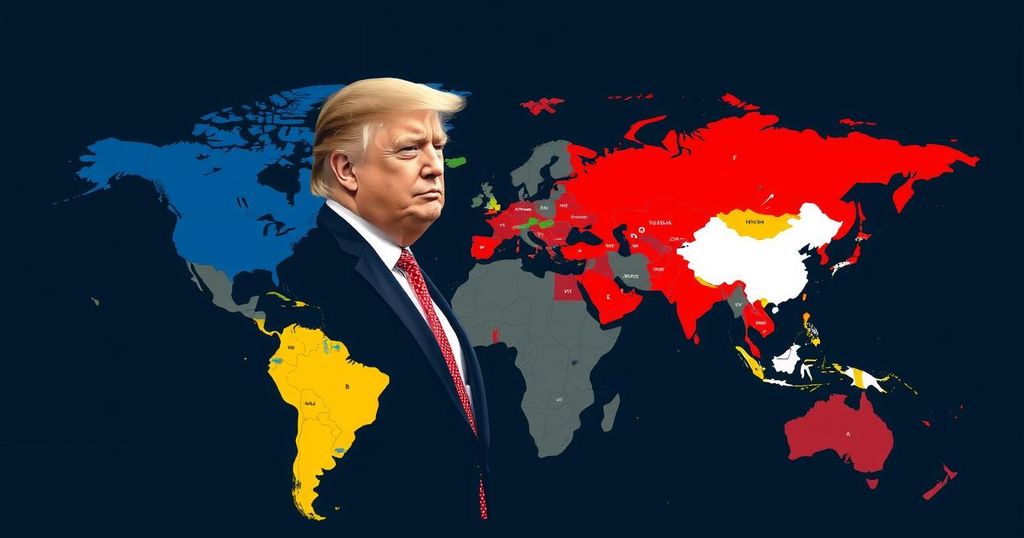Trump’s Foreign Policy Outlook: Implications for Ukraine, the Middle East, and China
Donald Trump’s recent election victory signifies profound shifts in U.S. foreign policy that may impact Ukraine, the Middle East, and China. His leadership is anticipated to prioritize non-interventionism and protectionism, with possible changes in military support and diplomatic strategies. His past record suggests he may pursue aggressive approaches while navigating delicate international relations. The outcomes of these shifts are poised to influence global stability and alignments significantly.
Donald Trump’s recent electoral victory indicates a potential reorientation of United States foreign policy, with likely implications for Ukraine, the Middle East, and China. His campaign embraced themes such as non-interventionism and protectionist trade policies under the banner of “America First.” This shift comes at a time of global unrest, particularly in areas afflicted by conflict. By examining his previous term from 2017 to 2021 and his campaign assertions, one can infer the possible foreign policy direction he may pursue. With respect to Ukraine, Trump has expressed confidence in his ability to resolve the ongoing conflict with Russia quickly, although he has not provided detailed strategies. Advisors from his past administration have suggested that the U.S. should maintain arms support for Ukraine, contingent upon Kyiv engaging in peace discussions with Russia, possibly delaying Ukraine’s NATO aspirations. His critics assert that such a strategy could undermine European security and suggest a trend of prioritizing U.S. resources over allied commitments. In the Middle East, Trump has vowed to reinstate peace initiatives, asserting that his prior strategies would have deterred Hamas from attacking Israel. His administration’s aggressive stance against Iran included withdrawing from the nuclear deal and imposing sanctions, actions that were perceived as favoring Israel at the expense of Palestinian interests. His previous administration’s support for the Abraham Accords normalized relations between Israel and some Arab nations without addressing Palestinian statehood, leaving them increasingly marginalized in the geopolitical landscape. How he might navigate Israeli relations while pursuing peace remains uncertain. Concerning China, Trump’s administration viewed Beijing as a strategic competitor and implemented tariffs that exacerbated trade tensions. These tariffs remain largely in place under the Biden administration, despite a purportedly more responsible diplomatic approach. Trump has acknowledged the complexity of his relationship with China’s leadership, oscillating between admiration and criticism. If reelected, he may adopt a more unilateral stance reminiscent of his earlier term, particularly regarding military support for Taiwan, suggesting that he could implement severe tariffs should tensions escalate. In summary, Trump’s return to the presidency could lead to a significant departure in U.S. foreign affairs, focusing on isolationist principles while simultaneously navigating complex international relationships. His rhetoric suggests a preference for direct intervention in global crises but raises concerns among allies and rivals alike.
The geopolitical context of Trump’s presidency had been marked by significant tensions in multiple regions, including Europe, the Middle East, and Asia. Ukraine’s ongoing conflict with Russia posed challenges for NATO and U.S. foreign policy interests. The Middle East was characterized by a complex web of alliances and conflicts, particularly regarding Israel and Palestinian interests. Trump’s initial term was defined by aggressive posturing towards Iran and relations with Israel, which created considerable shifts in diplomatic relations in the region. Lastly, interactions with China have been underscored by trade disputes and strategic competition, as the U.S. sought to counteract Chinese influence and assert its own economic competitive stance in global markets.
In conclusion, Donald Trump’s electoral victory could herald a transformative shift in U.S. foreign policy shaped by his “America First” ethos. Potential strategies to resolve the Ukraine crisis and the ongoing conflicts in the Middle East will be closely scrutinized, along with his approach to China and trade relations. The implications of these changes will resonate not only within the U.S. but across the global stage, affecting alliances, security dynamics, and international economic relations.
Original Source: www.bbc.com




Post Comment